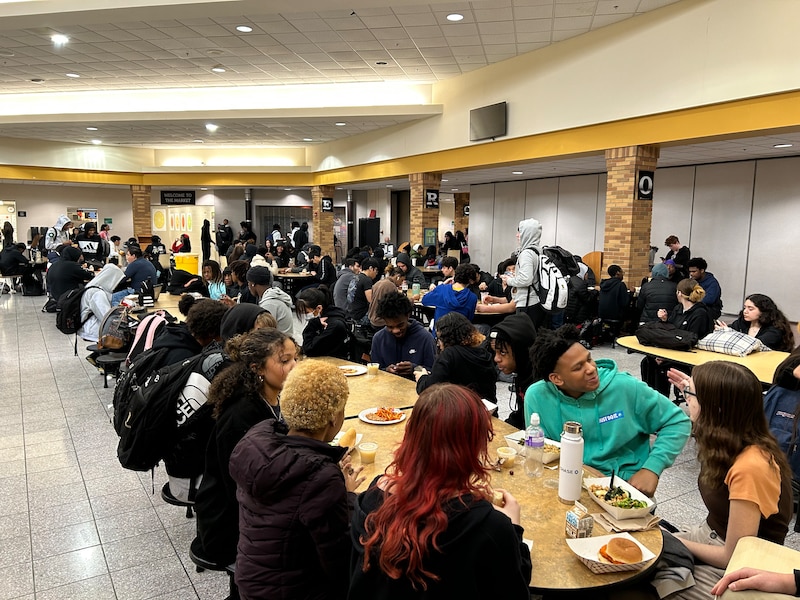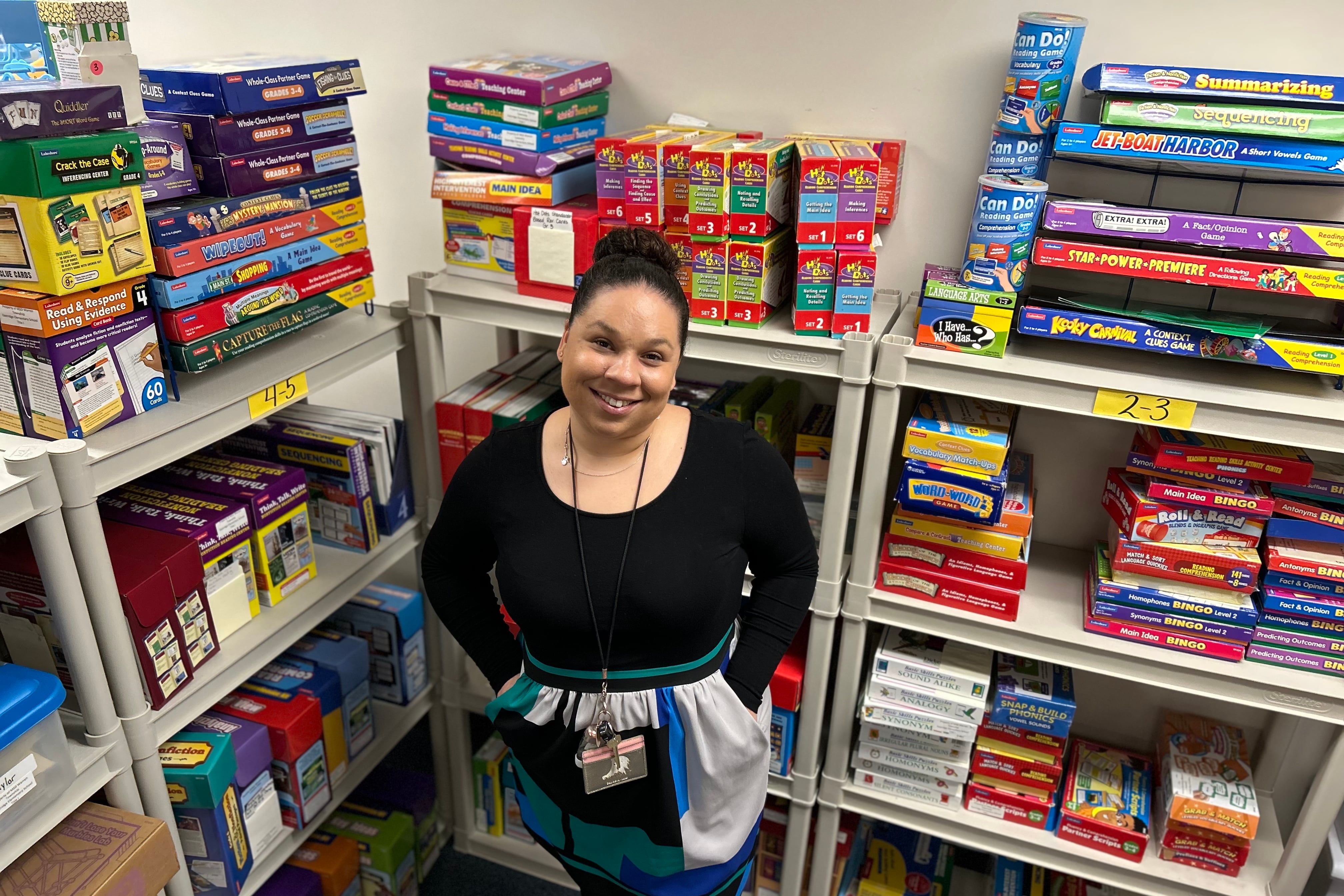Tabitha Jackson couldn’t have arrived at Eastridge Elementary at a more crucial time.
The pandemic wreaked havoc on learning, and the return to in-person classes proved tough. Her position as a family engagement liaison, funded through federal coronavirus relief dollars, had one major goal: Get families back to school.
Since 2021, Jackson has helped parents find rental assistance, directed families to childcare providers, and visited the homes of students who are chronically absent. Today, Principal Tomeka Johnson doesn’t know how she ever ran the school without her. Attendance has ticked up from last year, she said, and the school has earned back trust from parents.
“She’s able to provide those resources and take some of that load off of parents,” Johnson said. “It really helps parents get kids to school.”
But the roughly $45 million that the Metropolitan School District of Warren Township received in federal coronavirus relief funds — money that supports jobs like Jackson’s — will run out relatively soon.
Now, the Warren Township district is asking voters for an $88 million property tax increase over eight years, in part to maintain the support it received from the Elementary and Secondary School Emergency Relief (ESSER) funding that the state says must be spent by the end of 2024.
The district is far from alone: From Michigan to New York City and beyond, the upcoming expiration of federal COVID aid is a challenge facing many school leaders. After districts accelerated their spending of that money last year, they must figure out whether — and how — to preserve jobs like Jackson’s after the money runs out.
The ballot question the Warren Township district will place before voters in May would replace the current 2018 referendum rate for operating expenses, increasing it from 21 cents per $100 of assessed property value to 30 cents.
Officials estimate the new tax rate would generate roughly $11 million annually over eight years. It would fund a few of the programs launched during the pandemic.
But the ballot question also seeks to continue funding positions currently covered by the 2018 tax increase (which is set to expire in 2026), including $1.6 million for a district police department and $2.1 million for 24 school counselors.
Even with property values on the rise, district leaders also say additional funding is needed to keep up with increasing costs of everything from diesel fuel to property insurance.
“It’s just simply more expensive to run a school district in 2023 than it was in 2018,” said Matthew Parkinson, the district’s chief financial officer.
Superintendent Tim Hanson stressed his district isn’t looking to pay for new programs, but simply maintain all of the district’s current efforts.
“And in order to do that, we need this referendum passed,” he said.
Referendum would continue ESSER-funded efforts
Warren Township’s pitch to voters covers a wide variety of efforts supported by federal pandemic dollars, from helping students get to school to competitive support staff pay.
In an attempt to battle a bus driver shortage that’s plagued many districts during COVID, for example, the district increased the starting salary for its bus drivers this fall by $4 an hour to roughly $22.50.
Keeping bus driver pay competitive is part of an estimated total $3 million in annual transportation costs to be covered by the referendum. Warren Township’s pay hike hasn’t entirely solved the problem: As of early February, Warren still had 20 vacancies out of 115 full-time positions.
Professional development, support staff compensation, and family engagement liaisons make up another annual $2.8 million that officials hope to keep in their annual budget.
The district used federal dollars to provide stipends for teachers to participate in training programs, including one on the science of reading.
And after completing a market analysis of hourly support staff pay, the district also used about $3.5 million in ESSER funds to increase compensation for its roughly 750 full-time support staff.
The analysis found that $15 per hour was the threshold for remaining competitive in hiring employees such as custodians, secretaries, and instructional assistants, Hanson said.
“We have provided an additional hourly stipend to meet or exceed that $15 threshold,” he said. “It’s our hope with the passing of the referendum that we would be able to maintain a competitive level.”
Another annual $1.5 million will cover the cost of technology such as iPads and Chromebooks.
While the district adopted 1-to-1 devices for every student before the pandemic, it also used ESSER relief funds to purchase devices, since some were lost by students when they were sent home over the pandemic, officials said.
The new referendum funding will cover the annual cost of recycling or replacing those devices, according to the district.
At Eastridge Elementary, where roughly 76% of students qualify for free or reduced-price lunch, the pandemic has led some parents to declare bankruptcy. Others have lost jobs or been pushed to the brink of eviction.
Through it all, Jackson has tried to connect them to resources.
“This year, now that I’ve built those relationships, I’m really able to have those in-depth conversations about attendance and really hone in on: ‘Why are you not able to get your kid here? How can I help?’” she said. “That trust has been built.”
Pre-pandemic support for counselors pays dividends
The referendum will also continue services adopted before the pandemic that have since become even more vital.
Kristen Linenberg joined Warren Central High School as a counselor in 2018 with a caseload of 500 students — twice the size recommended by the American School Counselor Association.
That meant 500 seniors with a medley of academic and personal challenges that Linenberg tried to address as she worked to get them to graduate.
“We were very reactive, because that’s truly what we had time to do,’ she said. “And it was just, whatever happened that day, that’s kind of what you dealt with.”

The initial funding from the 2018 referendum provided 12 counselors in middle schools and eight at the high school. The starting salary for those with a master’s degree is $48,000.
But after the pandemic, the district added four more counselors at the high school to relieve Linenberg and others. That move was made possible by increased property values that generated more referendum revenue than projected in 2018.
Now, Linenberg’s caseload has dropped to roughly 300 students, allowing her to spend more one-on-one time with students. That’s especially helpful as the need for counseling services has increased in COVID’s wake.
“Not every student needs crazy intensive therapy and counseling. Sometimes they just need a safe place to vent about a bad day,” she said. “And so us having more counselors and a smaller caseload allows us to have the time to do that.”
District officials are cautiously optimistic that voters will support the tax increase. In 2018, 65% of voters backed the new tax rate.
Johnson, Eastridge Elementary’s principal, didn’t realize how many needs her students had until she actually got the funding for staff such as liaisons and counselors. The upcoming referendum is not about money, she argued, but about need.
“This is our community and we have to invest in it because if we don’t, then who will?” she said. “Our role is to raise and grow children, and they need us.”
Amelia Pak-Harvey covers Indianapolis and Marion County schools for Chalkbeat Indiana. Contact Amelia at apak-harvey@chalkbeat.org.







